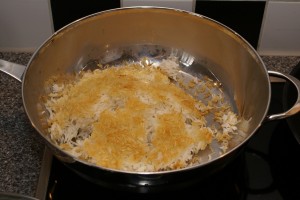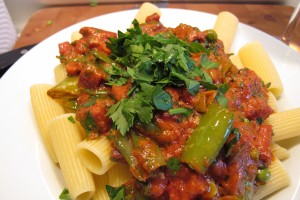When I cook, I tend to rely on recipes and I am not very adept at making up recipes from scratch. Maybe this is because I don’t have enough experience yet, but I think it is more due to my idea of what cooking is: Science.
Cooking is a wonderful application of chemistry and physics, and when I cook, I perform experiments: I have a hypothesis of the outcome (delicious food), I decide on a set of rules to carry out the experiment (recipe) and follow them (take the right ingredients and prepare them). If the outcome corresponds to my hypothesis, I know that the method works. For any meal, there is a maximum achievable level of tastiness (MALT) limited by the quality of the ingredients and the recipe. There is also only one MALT, which is only achieved when everything fits together perfectly. That is not to say that any other mixture will taste bad – but there is only one mixture where it will taste as good as it can. Therefore, one set of discrete values for each method provides the MALT. If you put in too much or too little salt, it will taste worse than it could. Naturally, there is a band of tastiness, a set of more than one outcomes where the meal will still taste good or even great.
It would be a fallacy to assume that there is only one perfect MALT. Since everybody has different tastes, everybody will have a different MALT, and while some amount of salt might lead to MALT for one person, your results may vary.
How can you apply this to your next cooking session?
- Think about a recipe before you use it. Specifically, note the order of ingredients and how each will influence the finished meal. For example, most of the time you should add pepper as late as possible (after serving), because its tastiness (but not spiciness) decays quickly when heated.
- Taste each ingredient (except raw meat and eggs) before you use it. Try to find its taste in the finished meal.
- Taste the meal often, in all stages of preparation. The earlier you detect some mistake, the easier it is to correct.
If you can read German, I recommend Werner Gruber’s Die Genußformel: Kulinarische Physik (ISBN 3902404590), where I got some really great inspiration for cooking in general and its scientific nature in particular.
For English readers, less scientific, but still great writing about cooking is provided by Reverend Chef, my friend Elaine’s blog. I especially liked her posts on playing with food and on the perfect Mint Julep.
Happy Cooking! 🙂



Really interesting thought about cooking as science! I tend to view it as more of an art form that’s fun to play around with, like fingerpainting. Also, thanks for the blog plug! (: